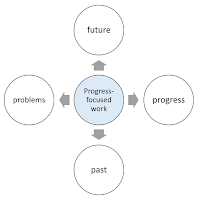The importance of talking about problems and the past
Sometimes people make the following two assertions about progress-focused work: (1) progress-focused work is not focused on problems but on progress, and (2) progress-focused work is not focused on the past but on the future. These assertions sound enthusiastic and I'd rather not be a killjoy but I find it important to contradict them. Neither talking about the past, nor talking about problems is a taboo in progress-focused work. Indeed, both are important elements in virtually every progress-focused conversation. I'll explain below.
(1) The importance of talking about problems. Talking about problems can be a useful start of progress. Not always, but often, talking about problems will be part of progress-focused conversations. How you talk about problems determines how effective the conversation will be. Indeed, there is an ineffective way of talking about problems which you should beware of. Accusing or criticizing people will seldom work. Also, searching for ultimate causes of problems is often (not always) counterproductive. In complex situations it is often not possible to identify ultimate causes of problems and searching for them can make people fearful and defensive.
But there is also an effective way of talking about problems. In this way of talking you allow people to explain what they think is not going right. By being taken seriously they will experience the conversation as respectful and relevant because it focuses on what they thing is most important. Once problems have been clearly described it is clear where progress should happen. When it has become clear what should become better you can focus on what the desired situation looks like. In our 7-steps model you can read how you can proceed the conversation from there.
(2) The importance of talking about the past. The idea that progress-focused work is only about the future is also wrong. Of course, talking about the future is an indispensable part of progress-focuse work. But, nearly always, so is talking about the past. Not every way of talking about the past is effective. For example, focusing on who did what wrong and why, is very unlikely to contribute to progress.
But talking about past successes is often very useful. By remembering and discussing examples in which one has already managed to achieve something which resembles a challenge which is now relevant, one's sense of competence is strengthened and ideas for steps forward can be found. In our 7-steps model you can find some examples of questions which you may use to talk effectively about the past.
(1) The importance of talking about problems. Talking about problems can be a useful start of progress. Not always, but often, talking about problems will be part of progress-focused conversations. How you talk about problems determines how effective the conversation will be. Indeed, there is an ineffective way of talking about problems which you should beware of. Accusing or criticizing people will seldom work. Also, searching for ultimate causes of problems is often (not always) counterproductive. In complex situations it is often not possible to identify ultimate causes of problems and searching for them can make people fearful and defensive.
But there is also an effective way of talking about problems. In this way of talking you allow people to explain what they think is not going right. By being taken seriously they will experience the conversation as respectful and relevant because it focuses on what they thing is most important. Once problems have been clearly described it is clear where progress should happen. When it has become clear what should become better you can focus on what the desired situation looks like. In our 7-steps model you can read how you can proceed the conversation from there.
(2) The importance of talking about the past. The idea that progress-focused work is only about the future is also wrong. Of course, talking about the future is an indispensable part of progress-focuse work. But, nearly always, so is talking about the past. Not every way of talking about the past is effective. For example, focusing on who did what wrong and why, is very unlikely to contribute to progress.
But talking about past successes is often very useful. By remembering and discussing examples in which one has already managed to achieve something which resembles a challenge which is now relevant, one's sense of competence is strengthened and ideas for steps forward can be found. In our 7-steps model you can find some examples of questions which you may use to talk effectively about the past.

Comments